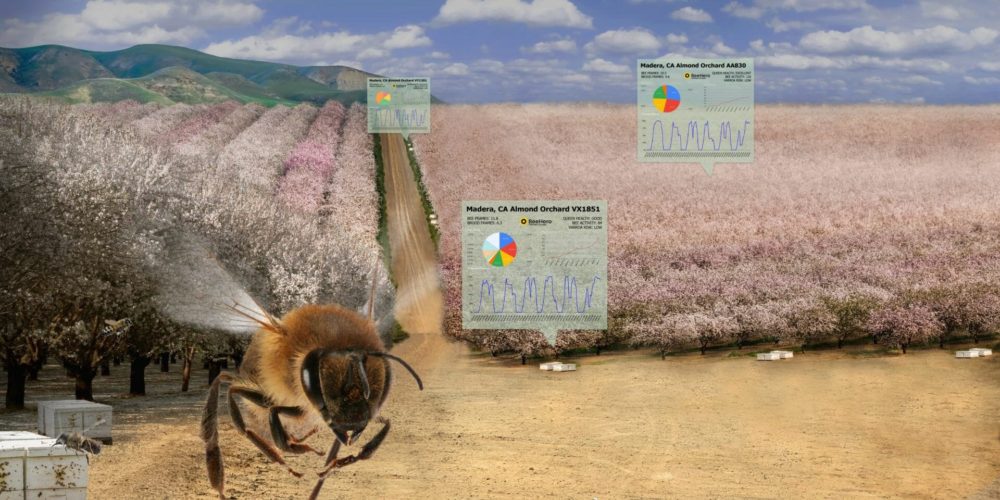Although the number of crops that rely on bee pollination is increasing, according to Palo Alto-based Beehero, changes across a number of variables mean that the same number of hives in an orchard may not be providing all the pollinator punch required.
“The equation of beehives-per-acre doesn’t hold much,” co-founder and CEO Omer Davidi told AFN.
“The density of trees has changed, microclimates have changed, the efficiency of bees has changed but the numbers of hives-per-acre stays the same. This means you have less pollination for the flower which is one of the causes of insufficient pollination. We are looking at it more as a bees-per-tree model.”
Describing itself as a precision pollination service, today announced a $4 million seed round from Rabo Food & Agri Innovation Fund, UpWest, iAngels, Plug-N-Play, and J Ventures. The startup claims to operate the world’s largest database of bee and pollination performance and analysis, beehive data, yield performance benchmarking, and more. It combines machine learning algorithms with low-cost sensors placed in the hive to create smart beehives that stimulate maximum output. This allows growers and beekeepers to be automatically notified of changes to key colony health indicators that provide actionable data, year-round, informing pivotal decisions about feeding, treatment, swarm management, and queen replacement.
It’s precision pollination services enable commercial growers to optimize crop-yield for many major crops and have demonstrated success across a range of produce and flowers in self-pollinated, wind-pollinated, and insect-pollinated fields. The company currently has over 20 thousand hives, or an estimated 1 billion bees, already in contract.
“We invest in companies that look beyond traditional models of thinking and behavior,” said Richard O’Gorman of Rabobank in a statement announcing the funding. “The health of pollinators plays a fundamental role in supporting the world’s natural ecosystem and food production. In a world where food supply is under increasing pressure, it is imperative that we maintain the health and sustainability of bees. There is no greater call than ensuring the world’s food supply and protecting the pollinators responsible for it. Beehero connects bees to the digital age and by improving hive health increases crop yields increase. I believe Rabobank’s network and financial support will play a valuable role in Beehero’s transformation of the pollination industry and will benefit all stakeholders.”
BeeHero plans to use the funding to promote commercialization. Over the last months, it’s moved from a pre-revenue startup to a company bringing in seven figures. The pandemic has not impacted operations other than making it more challenging to meet face-to-face with new business prospects.
Even if Davidi is underscoring a widely known and verifiable problem with how pollination is taking place, changing a farmer’s behavior can be a challenge. Decisions about the number of hives to order are often based on what someone’s predecessor taught them to do, for example.
“When it comes to thinking about the bees-per-tree model, the industry finds it hard to talk this way because no one knows until now how many bees or bee frames you have in every colony. It’s super hard to measure. It depends on the strength of the colony. To inspect it physically is impossible because we are talking about millions of hives.”
By gathering data about hive activity at a more granular level, such as the number of flowers a bee visits, the topography, the crop type, and the location, a grower or beekeeper can calculate the pollination force needed to maximize coverage. Although many consumers have never likely contemplated the bees-for-hire industry, it’s a massive industry and integral part of the specialty crop universe. The US Department of Agriculture ERS even maintains a database of pollination services to help farmers get bees under contract.
A few other startups are tapping into the tech-powered pollination concept. Argentinian startup BeeFlow raised a $3 million seed round last year. One of BeeFlow’s technologies enhances the bees’ immune system and performance to assist in cold weather pollination while the other trains bees to pollinate specific crops, which is key for low-nectar flowers like blueberry flowers that have a hard time holding bees’ attention. ApisProtect is another sensor-driven startup that measures different data points in beehives and provides keepers with alerts about issues that could lead to colony loss.
The Bee Corp offers a similar data monitoring system targeted for beekeepers who provide commercial pollination services. By its measure, pollination prices have climbed 300% since the turn of the century and many growers now list pollination as one of the three most expensive inputs required to cultivate almonds.
Complicating the hive-per-acre efficiency paradigm even further, bees have seen serious reductions in population size over recent years. Loss of natural habitat, crop protection products, and the spread of pests due to globalization are just a few factors impacting bee health. Each dip in the world’s bee population has serious environmental and financial consequences considering that crops pollinated by honey bees bring $577 billion globally, according to BeeHero.
“Bee welfare is something we want to address as well. This is about creating a sustainable environment where bees can work for many years not just this season,” Davidi explained. “We are not here just to extract dollars. We want to make this the most sustainable process possible.”





